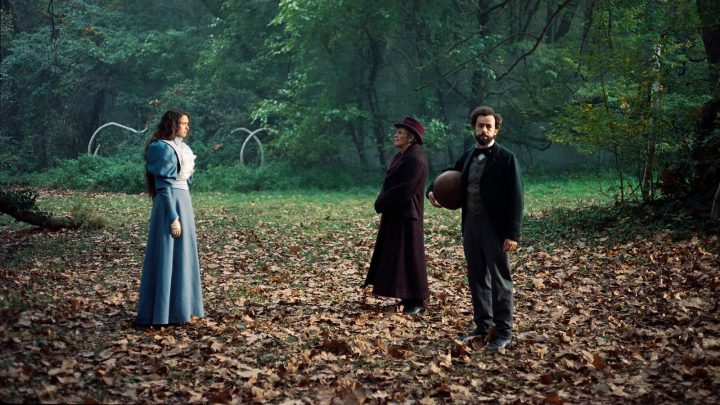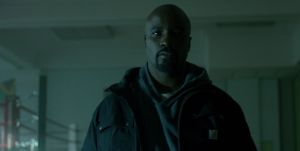
As the Oscars approach, studios end up releasing a variety of prestige films in a December flurry in order to make the films eligible and present in the Oscar voters’ minds. As a result, we aren’t able to do traditional reviews for all of these films, since so many come out in a cluster. But with Flickchart’s great Top 20 Films of 2023 list out, and the Oscars ahead, we’re going to round-up several of the late 2023 releases in the traditional Flickchart manner: by ranking them! Let’s see what the best of this bunch were.
6. Ferrari
While I am all about the Adam-Driver-playing-Italian-business-moguls cinematic universe, Michael Mann‘s Ferrari feels half as assured as Driver’s lead performance. Mann’s first film in nearly a decade didn’t quite live up to the hype. Despite covering only one summer in the famed automaker’s life, it manages to feel unfocused and scattershot. It was as though Mann couldn’t decide what he wanted to say and instead put all of it in there.
There are certainly strengths to the film. The lead performances from Driver and Penelope Cruz are pretty darn good, and Mann remains skilled at action. The racing sequences that serve as the act three capstone and culmination of the film’s drama to that point are tense and exciting. And the film’s sudden tragic ending punches due to the sharpness of the edit.
But the script needed a touchup to bring all of the various elements into focus. Even the ending loses focus again after the tragedy and meanders its way to a conclusion. Here’s hoping that Driver’s hypothetical turn as Armani or Prada actually leads to a strong movie and that Mann can finally recapture his glory as well.
Current Global Ranking: #69,465
Total Users Ranking: 53
5. Maestro
Bradley Cooper‘s second directed feature is another one focused on music, this time the life and work of Leonard Bernstein. Controversy over a nose prosthetic aside, Cooper’s turn is fairly strong, even if does become a bit of a caricature at times due to Cooper’s insistence on always matching the cadence of Bernstein.
This one stands slightly taller than Ferrari because of Cooper’s direction and an even better co-lead performance in the form of Carey Mulligan. Whatever flaws this film has, the scenes between Cooper and Mulligan arguing as husband and wife are arresting. They capture a realism where a couple that knows and loves each other can hurt each other perfectly, but also are never truly cruel. There is a love in these scenes that is endearing, even when they are fighting over smothering each other’s careers.
Cooper’s direction perhaps overuses the closeup, and his film is occasionally meandering. But it is a compelling work on the whole and may even nab an Oscar nomination or two. It’s easy to make scenes poignant when you rely on Bernstein’s music to score them, but a scene or two where Bernstein is conducting and pouring his entire being into it are electrifying to witness.
Current Global Ranking: #16,542
Total Users Ranking: 142
4. The Color Purple
Color me surprised to learn that the original film version wasn’t a musical, as a musical seems to fit the material quite naturally. Neither a remake of the 1985 Steven Spielberg work nor a direct adaptation of the stage musical, this version instead combines elements of both to deliver a moving, if overly long work.
The film focuses on Celie, played by Fantasia Barrino, living in a small Southern town and dealing with abuse from all angles: sexual and physical abuse from her older husband, a father who rejected her and sent her children away, and racial bigotry from the world around her. While Fantasia’s performance can veer towards repetitive, there is a power to this film. Director Blitz Bazawule brings to life all of the various colors of the film (including purple) to deliver a beautiful work. The film is wonderfully choreographed, with songs that have punch and pop.
The film also has a great supporting cast in the form of Taraji P. Henson and Danielle Brooks. Both steal the screen anytime they are on it, and their own tragedies and conflicts feel poignant as well, though a bit truncated by the film’s odd storytelling choices. Many of the film’s competing plot threads end up underdeveloped, perhaps the result of a long novel being cut down to make for musical numbers. And the musical nature does occasionally bump against the harshness of the content, almost trivializing things like abuse, though this is mostly a small concern. And credit has to be given to Colman Domingo‘s captivating turn as Mister, even as an abusive monster. That the film truncates his mild redemption story is another potential issue, but Domingo does his part.
While by no means a perfect or truly great work, The Color Purple does what its trailers promised: providing a new take on classic story. Despite its storytelling deficiencies, you can’t help but be moved by the film’s predictable yet effective ending. It has that grand musical finale energy to it that can’t help but get under your skin.
Current Global Ranking: #79,690
Total Users Ranking: 24
3. May December
Director Todd Haynes‘ latest work has a wild, all-over-the-place tonality that is both a strength and weakness of the film. Haynes wants us to feel all sorts of crazy feelings about the story. And thematically, the film acts as an interrogation of interrogation, about someone trying to figure out a predator, and whether or not that’s even something worth figuring out. May December isn’t fully satisfying all the time as a result of all of this, and it’s commentary in the end is a bit vague. Still, this film about an actress studying a child predator who then married her student is darkly compelling.
May December‘s bold editing, striking score, and wonderful cast bring it to life. Natalie Portman and Julianne Moore shine in the lead roles. The film’s ending puts such a new light on Moore’s role throughout that you begin to think about all of her decisions and ponder truth. Portman’s turn as the over-confident actress, convinced of her artistic technique, is likewise compelling, with lots of little moments between her and other characters that Portman uses to develop her character further, both the one she’s playing and the one her character is playing. Also sublime is Charles Melton. While his character starts off aloof, we get to know him more and more. He seems fine with his life, but cracks start to show throughout the film. This is where Melton brings it. The scene where he confronts Moore’s character and the one where he gets upset about Portman’s callous treatment of him are both exemplars of his skills.
This is a film that deliberately veers on the edge of camp. It takes dark subject material and places it under a comedic lens, all in service of a deliberate experiment to push the audience into examining the pretense of performance — both in the terms of acting in a film but also in the terms of the pretense we put on in life. This see-saw tonality won’t work for everyone as a result, and it isn’t entirely successful. All the same, Haynes demonstrates his prowess as a filmmaker in the bold choices he makes, and it’s a film that will stick with you.
Current Global Ranking: #7,629
Total Users Ranking: 179
2. Poor Things
Similarly to May December, Yorgos Lanthimos‘s newest work strikes a bold tone and sticks with you, even if it is a very different film in many ways. Lanthimos’s films have all used a quirky, off-kilter humor, overt sexuality, and wild premises to critique society. Here, he takes the Frankenstein story and puts his own twist on it, with visuals similarities to Wes Anderson and Robert Eggers as much as to Lanthimos’s own style. The result is a strikingly funny film, even if a bit more simplistic than one might hope.
Emma Stone is rightfully the center feature of this film. Her turn as the Frankenstein’s monster of sorts, a revived woman who goes on a journey of self-discovery, is fantastic. She embraces a physicality to her acting not seen before, and is quite funny. While the script has her character make a leap from the confused babble to more intelligent words overly quickly, she still sells most of this and keeps you entertained. Not to be dismissed are the supporting roles from Mark Ruffalo and Willem Dafoe. Ruffalo is wonderfully over-the-top as a preening English lawyer, with an accent that will leave you giggling. Dafoe’s screentime is more limited, but he too shares in the great physical comedy of the film that makes it work.
Lanthimos’s script is excellent in terms of the dialogue and jokes it makes. There are multiple laugh out-loud moments and a lot of visual humor. Lanthimos’s fish-eye lens is used as adeptly, as usual, but there are also gags that you simply have to see to understand. Where the script is a tad wanting is in the overall direction of the plot and character. It’s not poorly done per se, but it lacks the same uniqueness that the rest of the film has. It’s a film about casting aside social norms and doesn’t have much more to it than that. Films of liberation are fine, but it lacks a specificity outside of the humor to really make it resonate. By comparison to some of Lanthimos’s earlier works, there is a shallowness to it.
All the same, this is one of the most distinct releases of 2023. It demonstrates that Lanthimos’s talents as a director and editor place him among the best working today. As long as he continues to make movies, cinema will have something truly unique in it.
Current Global Ranking: #6,305
Total Users Ranking: 139
1. The Iron Claw
While stylistically not quite as bold as the prior two films, The Iron Claw tops this list due to the tragically compelling nature of its plot and characters. Despite the name and trailer, the film is not really about the whole family. Zac Efron’s Kevin Von Erich is the clear protagonist of the film, with it centered mostly on his perspective and his arc being the main one of note. Covering a span of years, we see the ups and downs of the family, all contending to be champions due to the pressure of the family’s demanding patriarch. That’s Fritz, the inventor of the Iron Claw and the Von Erich brand. The film ultimately centers itself on the the brand of masculinity espoused by Fritz, as well as the overall iron-like pressure from both parents to be excellent at all costs.
The film’s writing is its standout strength. Characters that are usually reduced to stereotypes, such as the over-demanding father, are given a well-rounded humanity that makes this film all the more compelling. And while Efron’s performance isn’t earth-shattering, he makes Kevin into a compelling character. While the film has too much of a penchant for conveying things via montage, and also on skipping over what might be compelling details, it does an excellent job of making Kevin relatable. Efron lends the character a natural charisma, and we naturally like him for wanting to watch over his younger brothers. In the first of many tearful and related scenes, Kevin seems to feel this duty as the second-oldest child, with the eldest having died as a toddler. While the film smartly doesn’t over-emphasize this scene, we get the sense that his survivor’s guilt combined with their father’s harsh and at times uncaring nature is a driving motivation for much of his life. The talk of a family curse only further drives him throughout the film.
The Iron Claw drowns so much in sorrow that you’d almost call it grief-porn. That is, until it starts pouring on sentiment in the final thirty minutes. The film overplays its hand in a couple of scenes, especially the last one where the dialogue literally spells out the takeaway the script wants you to have. But despite its imperfections, The Iron Claw is still a highly compelling work. The characters pop and the script delivers a nuanced take on what happens when we strive towards excellence, or are driven towards it for pride or to earn the approval of someone we care about. The Iron Claw is director Sean Durkin’s finest hour.
Current Global Ranking: #6,305
Total Users Ranking: 139


